|
|
|
Sort Order |
|
|
|
Items / Page
|
|
|
|
|
|
|
| Srl | Item |
| 1 |
ID:
154468
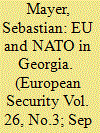

|
|
|
|
|
| Summary/Abstract |
Focusing on fragile Georgia since the early 2000s, the article takes a country-centred perspective on EU–NATO inter-organisationalism. It outlines the regional strategies of these core Western security institutions and assesses their complementarity and overlap across three sets of tasks: defence and empowerment, crisis management, and security sector reform. While there is hardly functional overlap in the first and second sets, in the third the EU and NATO intersect to a considerable degree. Also, there is no significant inter-organisational cooperation over Georgia. One key conclusion is that while field-level overlap clearly jeopardises institutional effectiveness, overlapping toolboxes – as in crisis management – allow for institutional flexibility when one international organisation setting offers reputational or practical advantages. Against this backdrop, a case can be made contra propositions of merging the Common Security and Defence Policy and NATO.
|
|
|
|
|
|
|
|
|
|
|
|
|
|
|
|
| 2 |
ID:
154465


|
|
|
|
|
| Summary/Abstract |
Events in Ukraine have rekindled discussions about NATO’s post-Cold War purpose and the way it relates to the EU. Through EU sanctions and a traditional military response from NATO, the West has manoeuvred itself into a paradoxical situation where every step it takes to reassure its Eastern allies increases rather than diffuses tensions with Russia. On the one hand, it seems that decades of carefully crafted strategic narratives of de-escalation are now in limbo. On the other, it might have indeed been the sustained attempt to create a liberal post-Cold War order that produced an “integration dilemma”, and ultimately drove Russia to the defensive realist logic of a Waltzian “security dilemma”. We argue that NATO’s reaction might have been based on a stylised threat and historical resentments rather than on a carefully calculated risk. Looking beyond the EU and NATO’s recent strategic choices, we argue that the situation can only be resolved by re-engaging Russia in a renewed de-escalatory dialogue that involves both the EU and NATO with a greater emphasis on the nuanced, but important, distinctions between the integration and security dilemmas.
|
|
|
|
|
|
|
|
|
|
|
|
|
|
|
|
| 3 |
ID:
154466


|
|
|
|
|
| Summary/Abstract |
The European Union (EU) and North Atlantic Treaty Organisation (NATO) are both institutions through which European states can engage in European defence–industrial cooperation. Each organisation embodies a unique set of institutional tools through which to manage issues such as the high and rising costs of defence procurement, technological innovation, defence R&D, standardisation, multinational capability programmes and interoperability. In short, the EU and NATO are institutional tools through which European states can manage the positive effects and negative consequences of defence globalisation. By drawing on an innovative conceptual framework derived from the institutional interaction literature, this article analyses how the EU and NATO interact with one another for defence–industrial issues. In doing so, the article principally aims to provide a conceptually informed analysis of the appeal of each body as a mechanism for defence–industrial cooperation and how each institution affects the other.
|
|
|
|
|
|
|
|
|
|
|
|
|
|
|
|
| 4 |
ID:
154469
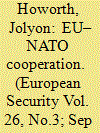

|
|
|
|
|
| Summary/Abstract |
The re-launch of the EU’s security and defence project in the wake of Brexit and the election of Donald Trump has focused the spotlight on the relationship between NATO and the EU. This article reviews the detailed aspects of that relationship as studied in the various contributions to this special issue. It argues that, over and above cooperation on the ground, the key issue to be addressed, which is usually skated over in the “big picture” literature on this question, is: where is all this heading? Is there a move towards a clear EU–NATO division of labour (if so, will it be geographic or functional?); or are the allies seeking a radical new balance of responsibilities and commitment as between the US and the Europeans for the stabilisation of the European neighbourhood? The paper argues that EU “strategic autonomy”, as called for in the Global Strategy document of 2016, can only be achieved through the Europeanisation of NATO itself.
|
|
|
|
|
|
|
|
|
|
|
|
|
|
|
|
| 5 |
ID:
154461
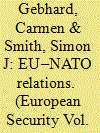

|
|
|
|
|
| Summary/Abstract |
This article provides the framework for the contributions to this special issue. It first puts the theme into context and outlines the main issues that justify further analytical engagement with European Union (EU)–North Atlantic Treaty Organization (NATO) relations to the extent we propose here. We then provide some historical background to frame the discussion, and in doing so also outline the current state of interaction between the EU and NATO. We then briefly contextualise the changing strategic environment shaping the relationship, including recent proposals to implement their declared “strategic partnership”. This introduction then presents an overview of the existing literature to set the stage for a renewed look at the research agenda that has emerged over the last two decades. We close with an outline of the individual contributions to this special issue, which are presented in two sections: one focusing on theoretical and conceptual approaches to the study of EU of EU–NATO relations, and one on the inter-organisational relationship in practice, followed by a concluding synopsis and outlook.
|
|
|
|
|
|
|
|
|
|
|
|
|
|
|
|
| 6 |
ID:
154464


|
|
|
|
|
| Summary/Abstract |
Studies of the relationship between the EU and NATO often focus on the limitations of cooperation, be it at the political or the operational level. However, little is known about the functioning of the political institutional linkages between the EU and NATO. This article therefore studies the main decision-making bodies of the two organisations at the political, ambassadorial level, namely the Political and Security Committee (PSC) of the EU and the North Atlantic Council (NAC) in NATO, as well as their joint meetings. The article employs an inductive Grounded Theory approach, drawing on open-ended interviews with PSC and NAC ambassadors, which reveal direct insights from the objects of analysis. The findings emphasise the impact of both structural and more agency-related categories on decision-making in these three fora. The article thus addresses both the paucity of study on these bodies more broadly and the complete lacuna on joint PSC–NAC meetings specifically, warranting the inductive approach this article endorses.
|
|
|
|
|
|
|
|
|
|
|
|
|
|
|
|
| 7 |
ID:
154463
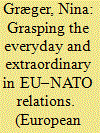

|
|
|
|
|
| Summary/Abstract |
Much scholarly work seeking to explain the EU–NATO relationship emphasises conflicting national or institutional interests, strategic individuals, and operational inefficiencies and overlaps. This article offers an alternative account of how both the everyday and the extraordinary in EU–NATO security cooperation can be identified and analysed by applying practice theory. Despite the “Cyprus issue”, which has left EU–NATO cooperation under Berlin Plus in political stalemate, regular interaction involving civilian and military EU and NATO staff at all levels and various sites has increased over the past decade. The article shows how a practice take is well suited to uncover the practical logic at work in these, predominantly informal EU–NATO encounters; how practices are established, enacted, and also abrupted. Furthermore, it discusses how shared “background conditions” – skills and experience – facilitate practices, learning, and community-building but also competition and rivalry.
|
|
|
|
|
|
|
|
|
|
|
|
|
|
|
|
| 8 |
ID:
154467


|
|
|
|
|
| Summary/Abstract |
To cope with increasing air traffic congestion, the European Union launched the Single European Sky in the early 2000s, intending to reform the European airspace which, at that time, was still fragmented by national frontiers. However, this has not been a purely civilian task, as military air transport is likewise affected. In fact, NATO has been concerned by the challenges facing the European Air Traffic Management environment due to the growing commercial aviation since its early days. For this, the European Defence Agency has been tasked to coordinate military views, thus opening a window of opportunity for EU–NATO relations. Both organisations promoting close coordination between the users of civilian and military airspace have built direct contact with each other. While examining how NATO and the EU are shaping their informal cooperation in this sector, the article considers the airspace community of users as a configuration of relations where inevitable inter- and intra-institutional power play is involved to reform the European airspace.
|
|
|
|
|
|
|
|
|
|
|
|
|
|
|
|
| 9 |
ID:
154462
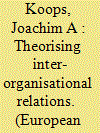

|
|
|
|
|
| Summary/Abstract |
This article explores the historical evolution of research on the “European Union (EU)–North Atlantic Treaty Organisation (NATO) relationship” since the 1950s and examines the numerous ways in which it has served as an important case study for applying and developing theory-guided and conceptual research on inter-organisational relations (IOR) in International Relations. After a dearth of policy-oriented research during the 1990s and early 2000s, a wide range of scholars have contributed to a “conceptual turn” in the study of EU–NATO during the last decade. This development, as this article will argue, not only signifies a stronger interest by scholars to understand the complex relationship between both organisations with the help of more theory-driven research, but also highlights that the EU–NATO relationship has become a “catalytic case study” in terms of inspiring conceptual experimentation and advancing efforts to theorise IOR more generally. The article provides for the first time a systematic stock-taking and analysis of the richness of concepts and theoretical debates related to EU–NATO relations research and offers scholars wider insights into the most promising approaches and analytical tools for understanding and theorising EU–NATO relations.
|
|
|
|
|
|
|
|
|
|
|
|
|
|
|
|
|
|
|
|
|